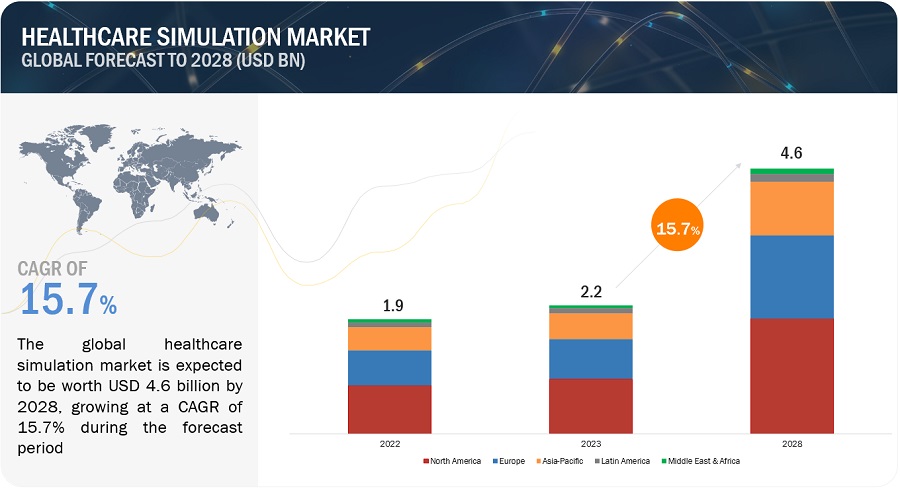The global healthcare simulation market is projected to reach USD 4.6 billion by 2028 from USD 2.2 billion in 2023, at a high CAGR of 15.7% during the forecast period. The market’s expansion is fuelled by an advancement in technology, such as high-fidelity manikins and virtual reality that have enhanced the realism and effectiveness of simulation training, for instance, high-fidelity simulators like Apollo (by Elevate Healthcare (formerly CAE)) and Nursing Anne Simulator (by Laerdal Medical) accelerates learning, reduces training time, and improves debriefing with automated patient responses; the growing complexity of modern medical procedures which requires training solutions offered by simulation. Further, the increasing number of medical schools is also propelling this market. For instance, according to Ministry of Health and Family Welfare, in India, the number of medical colleges has risen by 82%, from 387 before 2014 to 706 for the year 2024.

Healthcare Simulation Market Dynamics
Drivers
- Limited access to patients during medical training
- Rising technological advancements in medical education
- Growing demand for minimally invasive treatments
- Increasing focus on patient safety
- Growing preference for virtual interaction
Restraints
- Limited availability of funds
- Poorly designed medical simulators
Opportunities
- Shortage of healthcare personnel
- Growing awareness about simulation training in emerging economies
Challenges
- High cost of simulators
- Operational challenges
North America accounted for largest market share during the forecast period.
In 2022, North America commands the largest share of the healthcare simulation market. The expansion of the healthcare simulation market in North America can be ascribed to various factors, including increased access to technologies, firmly established distribution channels, a growing number of healthcare professionals seeking hands-on patient training, heightened demand for virtual and online training, and the presence of key market players in the region.
The prominent players in the healthcare simulation market:
- CAE (Canada),
- Laerdal Medical (Norway),
- Gaumard Scientific Co. (US),
- Limbs & Things (UK),
- Surgical Science Sweden AB (Sweden)
Recent Developments:
- In August 2021, Surgical Science Sweden AB completed the acquisition of Simbionix (US), aiming to deliver top-tier training for medical professionals by leveraging their respective technologies.
- In July 2021, CAE Inc. formed a partnership with Rush Center for Clinical Skills and Simulation (RCCSS), with the goal of enhancing patient safety and advancing healthcare education for both companies.
- In June 2021, Mentice AB entered into a collaboration with Thomas Jefferson University Hospitals to establish a Simulation Center of Excellence. This initiative aims to elevate and promote clinical training, introducing advanced Virtual Reality-based simulation solutions for physicians.
Conclusion:
